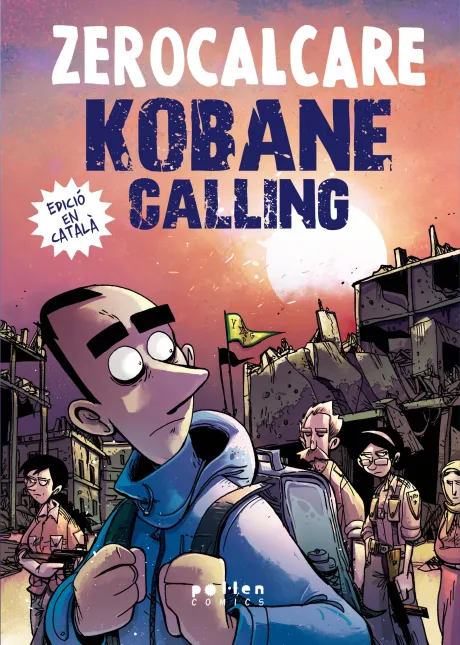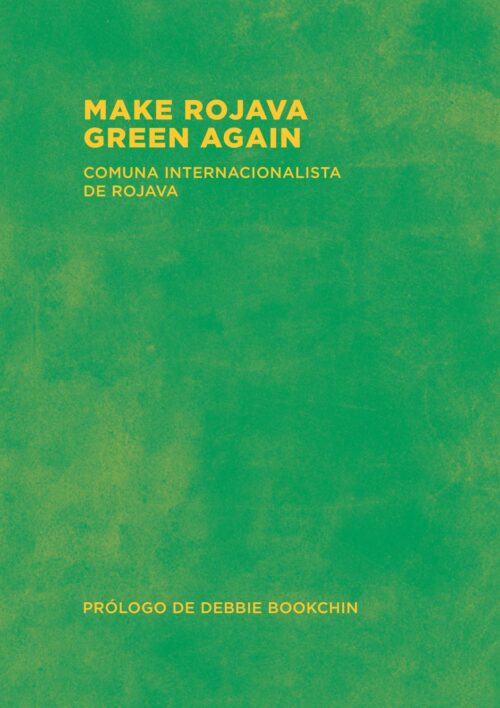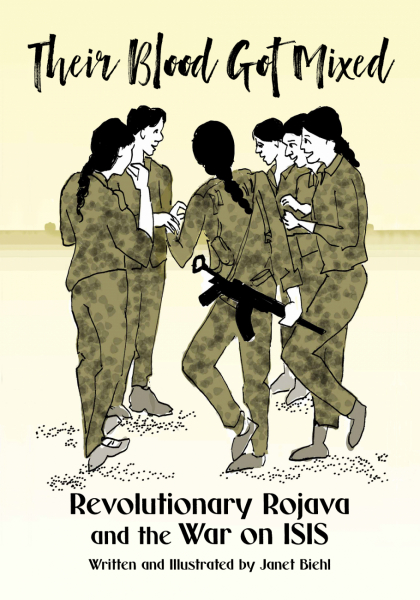-
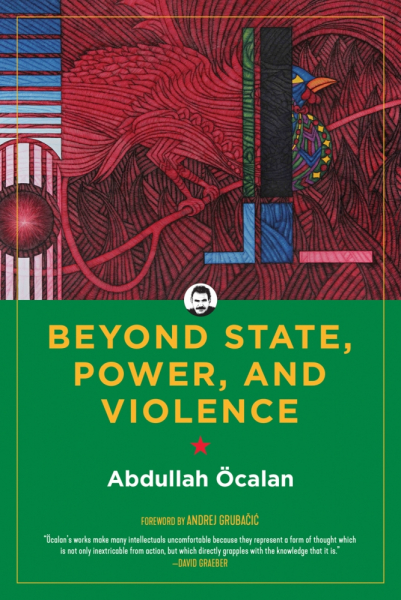 <p>After the dissolution of the PKK (Kurdistan Workers’ Party) in 2002, fear and uncertainty about the future of the Kurdish freedom movement threatened to unravel the gains of decades of organizing and armed struggle. From his prison cell, Abdullah Öcalan intervened by penning his most influential work to date: <em>Beyond State, Power, and Violence</em>.</p> <p>With a stunning vision of a freedom movement centered on women’s liberation, democracy, and ecology, Öcalan helped reinvigorate the Kurdish freedom movement by providing a revolutionary path forward with what is undoubtedly the furthest-reaching definition of democracy the world has ever seen. Here, for the first time, is the highly anticipated English translation of this monumental work.</p> <p><em>Beyond State, Power, and Violence</em> is a breathtaking reconnaissance into life without the state, an essential portrait of the PKK and the Kurdish freedom movement, and an open blueprint for leftist organizing in the twenty-first century, written by one of the most vitally important political luminaries of today. By carefully analyzing the past and present of the Middle East, Öcalan evaluates concrete prospects for the Kurdish people and arrives with his central proposal: recreate the Kurdish freedom movement along the lines of a new paradigm based on the principles of democratic confederalism and democratic autonomy.</p> <p>His vision of a democratic-ecological society has ushered in a new era for the Kurdish freedom movement while also offering a fresh and indispensable perspective on the global debate about a new socialism. Öcalan’s calls for nonhierarchical forms of democratic social organization deserve the careful attention of anyone interested in constructive social thought or rebuilding society along feminist and ecological lines.</p>
<p>After the dissolution of the PKK (Kurdistan Workers’ Party) in 2002, fear and uncertainty about the future of the Kurdish freedom movement threatened to unravel the gains of decades of organizing and armed struggle. From his prison cell, Abdullah Öcalan intervened by penning his most influential work to date: <em>Beyond State, Power, and Violence</em>.</p> <p>With a stunning vision of a freedom movement centered on women’s liberation, democracy, and ecology, Öcalan helped reinvigorate the Kurdish freedom movement by providing a revolutionary path forward with what is undoubtedly the furthest-reaching definition of democracy the world has ever seen. Here, for the first time, is the highly anticipated English translation of this monumental work.</p> <p><em>Beyond State, Power, and Violence</em> is a breathtaking reconnaissance into life without the state, an essential portrait of the PKK and the Kurdish freedom movement, and an open blueprint for leftist organizing in the twenty-first century, written by one of the most vitally important political luminaries of today. By carefully analyzing the past and present of the Middle East, Öcalan evaluates concrete prospects for the Kurdish people and arrives with his central proposal: recreate the Kurdish freedom movement along the lines of a new paradigm based on the principles of democratic confederalism and democratic autonomy.</p> <p>His vision of a democratic-ecological society has ushered in a new era for the Kurdish freedom movement while also offering a fresh and indispensable perspective on the global debate about a new socialism. Öcalan’s calls for nonhierarchical forms of democratic social organization deserve the careful attention of anyone interested in constructive social thought or rebuilding society along feminist and ecological lines.</p> -
 <p>En 2002, a los diecinueve años, Azad, un joven kurdo-iraní, fue reclutado por el ejército de Irán y obligado a luchar contra su propio pueblo. Al negarse a ir a la guerra contra sus compatriotas kurdos, Azad desertó y se fue de contrabando al Reino Unido, donde se le concedió asilo, se hizo ciudadano y aprendió inglés. Pero más de una década después, tras regresar a Oriente Medio como trabajador social a raíz de la guerra civil siria, Azad se encontró con que tendría que volver a coger un arma. En septiembre de 2014, tras veinticuatro días de entrenamiento intensivo como francotirador, Azad se convirtió en uno de los diecisiete tiradores voluntarios desplegados por el ejército kurdo cuando el ISIS asedió la ciudad de Kobani en Rojava, la nueva región autónoma de los kurdos.</p> <p>En <em>Largo alcance</em>, Azad cuenta la historia interna de cómo las fuerzas kurdas lucharon durante nueve meses en sangrientas batallas callejeras contra el Estado Islámico. Superados ampliamente en número, los kurdos tuvieron que matar a los yihadistas uno a uno, y Azad lleva a los lectores a un desgarrador viaje tras las líneas del frente rebelde para revelar el papel esencial de la unidad de francotiradores en la lucha, y finalmente en la derrota, del ISIS.</p> <p>Entrelazando los brutales acontecimientos de la guerra con la reflexión personal y política, Azad medita sobre el incalculable precio de la victoria: los efectos permanentes de la guerra en el cuerpo y la mente; la devastadora muerte de dos de sus compañeros más cercanos; la pérdida de cientos de voluntarios que murieron en la batalla. Pero, como explica Azad, fueron sacrificios que salvaron no sólo una ciudad, sino un pueblo y su tierra. Rojava fue liberada y el ISIS, que una vez amenazó al mundo, nunca se recuperó del todo.</p> <p>A la vez desgarrador y redentor, ‘Tiro a distancia’ es un relato dramático de la guerra moderna que cuenta la historia de cómo, contra todo pronóstico, unos pocos miles de hombres y mujeres lograron lo imposible y mantuvieron vivo su sueño de libertad.</p>
<p>En 2002, a los diecinueve años, Azad, un joven kurdo-iraní, fue reclutado por el ejército de Irán y obligado a luchar contra su propio pueblo. Al negarse a ir a la guerra contra sus compatriotas kurdos, Azad desertó y se fue de contrabando al Reino Unido, donde se le concedió asilo, se hizo ciudadano y aprendió inglés. Pero más de una década después, tras regresar a Oriente Medio como trabajador social a raíz de la guerra civil siria, Azad se encontró con que tendría que volver a coger un arma. En septiembre de 2014, tras veinticuatro días de entrenamiento intensivo como francotirador, Azad se convirtió en uno de los diecisiete tiradores voluntarios desplegados por el ejército kurdo cuando el ISIS asedió la ciudad de Kobani en Rojava, la nueva región autónoma de los kurdos.</p> <p>En <em>Largo alcance</em>, Azad cuenta la historia interna de cómo las fuerzas kurdas lucharon durante nueve meses en sangrientas batallas callejeras contra el Estado Islámico. Superados ampliamente en número, los kurdos tuvieron que matar a los yihadistas uno a uno, y Azad lleva a los lectores a un desgarrador viaje tras las líneas del frente rebelde para revelar el papel esencial de la unidad de francotiradores en la lucha, y finalmente en la derrota, del ISIS.</p> <p>Entrelazando los brutales acontecimientos de la guerra con la reflexión personal y política, Azad medita sobre el incalculable precio de la victoria: los efectos permanentes de la guerra en el cuerpo y la mente; la devastadora muerte de dos de sus compañeros más cercanos; la pérdida de cientos de voluntarios que murieron en la batalla. Pero, como explica Azad, fueron sacrificios que salvaron no sólo una ciudad, sino un pueblo y su tierra. Rojava fue liberada y el ISIS, que una vez amenazó al mundo, nunca se recuperó del todo.</p> <p>A la vez desgarrador y redentor, ‘Tiro a distancia’ es un relato dramático de la guerra moderna que cuenta la historia de cómo, contra todo pronóstico, unos pocos miles de hombres y mujeres lograron lo imposible y mantuvieron vivo su sueño de libertad.</p> -
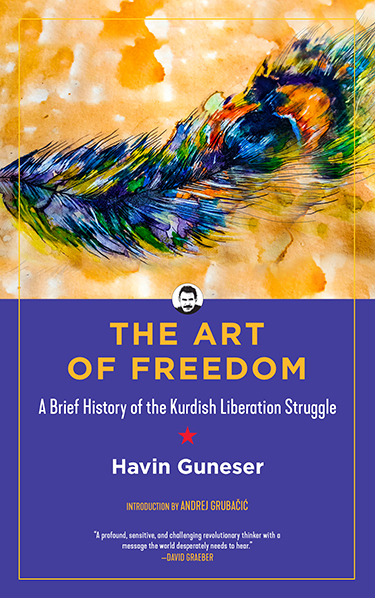 <p>The revolution in Rojava captured the imagination of the left, sparking a worldwide interest in the Kurdish Freedom Movement. <em>The Art of Freedom</em> demonstrates that this explosive movement is firmly rooted in several decades of organized struggle.</p> <p>In 2018, one of the most important spokespersons for the struggle of Kurdish Freedom, Havin Guneser, held three groundbreaking seminars on the historical background and guiding ideology of the movement. Much to the chagrin of career academics, the theoretical foundation of the Kurdish Freedom Movement is far too fluid and dynamic to be neatly stuffed into an ivory-tower filing cabinet.</p> <p>A vital introduction to the Kurdish struggle, <em>The Art of Freedom</em> is the first English-language book to deliver a distillation of the ideas and sensibilities that gave rise to the most important political event of the twenty-first century. The book is broken into three sections: “Critique and Self-Critique: The rise of the Kurdish freedom movement from the rubbles of two world wars” provides an accessible explanation of the origins and theoretical foundation of the movement. “The Rebellion of the Oldest Colony: Jineology—the Science of Women” describes the undercurrents and nuances of the Kurdish women’s movement and how they have managed to create the most vibrant and successful feminist movement in the Middle East. “Democratic Confederalism and Democratic Nation: Defense of Society Against Societycide” deals with the attacks on the fabric of society and new concepts beyond national liberation to counter it. Centering on notions of “a shared homeland” and “a nation made up of nations,” these rousing ideas find deep international resonation.</p> <p>Havin Guneser has provided an expansive definition of freedom and democracy and a road map to help usher in a new era of struggle against capitalism, imperialism, and the State.</p>
<p>The revolution in Rojava captured the imagination of the left, sparking a worldwide interest in the Kurdish Freedom Movement. <em>The Art of Freedom</em> demonstrates that this explosive movement is firmly rooted in several decades of organized struggle.</p> <p>In 2018, one of the most important spokespersons for the struggle of Kurdish Freedom, Havin Guneser, held three groundbreaking seminars on the historical background and guiding ideology of the movement. Much to the chagrin of career academics, the theoretical foundation of the Kurdish Freedom Movement is far too fluid and dynamic to be neatly stuffed into an ivory-tower filing cabinet.</p> <p>A vital introduction to the Kurdish struggle, <em>The Art of Freedom</em> is the first English-language book to deliver a distillation of the ideas and sensibilities that gave rise to the most important political event of the twenty-first century. The book is broken into three sections: “Critique and Self-Critique: The rise of the Kurdish freedom movement from the rubbles of two world wars” provides an accessible explanation of the origins and theoretical foundation of the movement. “The Rebellion of the Oldest Colony: Jineology—the Science of Women” describes the undercurrents and nuances of the Kurdish women’s movement and how they have managed to create the most vibrant and successful feminist movement in the Middle East. “Democratic Confederalism and Democratic Nation: Defense of Society Against Societycide” deals with the attacks on the fabric of society and new concepts beyond national liberation to counter it. Centering on notions of “a shared homeland” and “a nation made up of nations,” these rousing ideas find deep international resonation.</p> <p>Havin Guneser has provided an expansive definition of freedom and democracy and a road map to help usher in a new era of struggle against capitalism, imperialism, and the State.</p> -
 <p>Después de una guerra sin precedentes del régimen sirio y su aliado ruso contra los barrios orientales de Alepo, la oposición armada se vio obligada a salir de esos barrios en los que se había atrincherado una vez destruidos en su mayoría, quedando a ras de suelo. Dicha escena se repitió en muchas regiones de Siria: caravanas de autobuses verdes del gobierno llegaban a la zona de conflicto para transportar a los combatientes con su armamento ligero, así como a algunos civiles a Idleb. Los autobuses verdes se convirtieron en un símbolo de la victoria de las fuerzas del régimen. De ahí nació la idea de la novela que tenéis en vuestras manos: <em>Un autobús verde sale de Alepo</em>.</p> <p>Con esta novela he querido realizar un seguimiento de la situación de los civiles en el contexto de guerra: civiles que no quieren guerras ni conflictos. He querido mostrar que la neutralidad no sirve en las guerras. En las guerras uno se convierte en víctima, ya sea de un bando o de otro. El fuego de la guerra no distingue entre un árbol seco y uno verde: es un fuego ciego que incendia todo el bosque. Por medio de esta novela he querido, en primer lugar, condenar al régimen y, en segundo lugar, a la guerra fundamentalmente. He intentado mostrar las consecuencias de todos estos peligros para una única familia, su desmembramiento y su dispersión, así como el destino que aguarda a miles de familias mientras la salvaje máquina de la guerra continúe activa.</p>
<p>Después de una guerra sin precedentes del régimen sirio y su aliado ruso contra los barrios orientales de Alepo, la oposición armada se vio obligada a salir de esos barrios en los que se había atrincherado una vez destruidos en su mayoría, quedando a ras de suelo. Dicha escena se repitió en muchas regiones de Siria: caravanas de autobuses verdes del gobierno llegaban a la zona de conflicto para transportar a los combatientes con su armamento ligero, así como a algunos civiles a Idleb. Los autobuses verdes se convirtieron en un símbolo de la victoria de las fuerzas del régimen. De ahí nació la idea de la novela que tenéis en vuestras manos: <em>Un autobús verde sale de Alepo</em>.</p> <p>Con esta novela he querido realizar un seguimiento de la situación de los civiles en el contexto de guerra: civiles que no quieren guerras ni conflictos. He querido mostrar que la neutralidad no sirve en las guerras. En las guerras uno se convierte en víctima, ya sea de un bando o de otro. El fuego de la guerra no distingue entre un árbol seco y uno verde: es un fuego ciego que incendia todo el bosque. Por medio de esta novela he querido, en primer lugar, condenar al régimen y, en segundo lugar, a la guerra fundamentalmente. He intentado mostrar las consecuencias de todos estos peligros para una única familia, su desmembramiento y su dispersión, así como el destino que aguarda a miles de familias mientras la salvaje máquina de la guerra continúe activa.</p>



